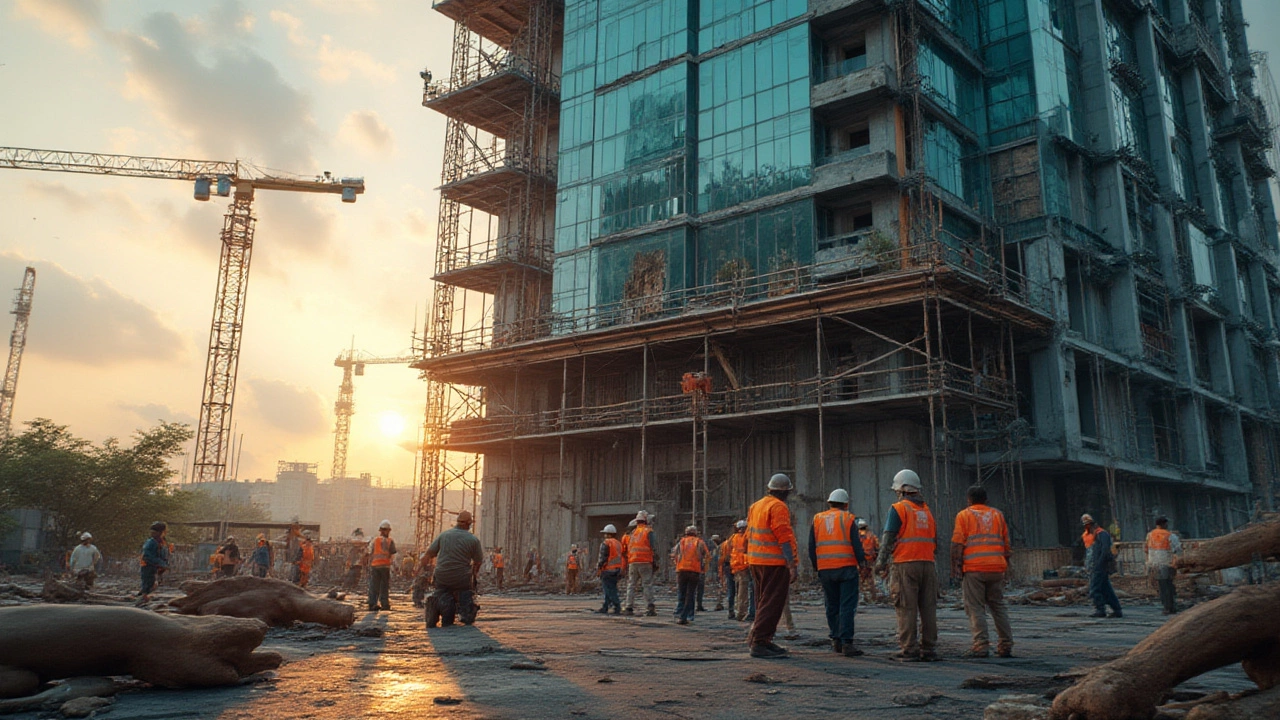The world of construction is filled with terms that we might hear often but never truly understand, such as why builders are frequently referred to as 'contractors.' It might sound like a purely legalistic designation, but this title carries more weight than you might think.
A look into history reveals how the word 'contractor' emerged and why it stuck. Today, it signifies not just a role or job title, but a trusted professional bearing responsibility for delivering results with precision and agreement. Contractors aren’t just builders; they are project managers who bring architectural blueprints to life, holding the project pieces together.
Dive into the fascinating world of contracting and construction, and discover the roles, history, and advantages that come with hiring a seasoned contractor. Whether you’re planning a small home renovation or a large commercial development, knowing why 'contractor' is the chosen term can enhance your understanding and efficiency as you embark on these endeavors.
- Understanding the Contractor Role
- History of the Term 'Contractor'
- Contractor Responsibilities
- Advantages of Hiring a Professional Contractor
Understanding the Contractor Role
The role of a building contractor is multifaceted and far from just swinging a hammer at a construction site. These professionals are the linchpins in any construction project, taking the blueprint handed to them and executing each step with a keen eye for detail and efficiency. At the heart of their work lies the ability to manage both people and resources, which means juggling the demands of various stakeholders while ensuring that timelines are met. The contractor's job involves serious organizational skills as they need to coordinate among architects, engineers, suppliers, and workers, uniting their efforts toward the completion of the project.
Contracts are drawn up for a reason—they outline the necessary blueprint, timelines, and monetary agreements between the contractor and the hiring party. Typically, these documents serve as the backbone of construction projects, setting clear expectations and milestones. This necessity for documentation is why the profession is steeped in its name: 'contractor.' It's about fulfilling agreements and maintaining trust through legally binding arrangements. The contractor is accountable not just for physical construction but for adhering to these defined parameters while also managing risks and resolving issues that arise during the process.
People may think of contractors only as site managers, but they are also financial guardians who tirelessly work to keep the project within budget constraints. They are responsible for sourcing materials at competitive prices and ensuring that labor costs align within the client's fiscal boundaries. This cost management is critical, as any overrun can lead to conflicts and dissatisfaction. Beyond the numbers, contractors must ensure compliance with local building codes and safety regulations to prevent potential legal woes down the line. In this regard, their knowledge and adherence to laws are just as important as their construction-related skills.
Construction is a dynamic and demanding field, and contractors often stand as the bridge between creative visionaries—like architects—and the tangible, physical spaces we live and work in. It is through their meticulous project planning and exhaustive oversight that dreams are transformed into reality. The impact of their work is visible, yet many of the decisions and challenges they face along the way remain behind the scenes, their importance underappreciated by those outside the industry.
"A successful contractor balances the art of building with the science of management, turning architectural ideas into functional realities," asserted renowned construction consultant Mike Patterson.
The journey of a contractor from a project's conceptual phase to its completion is often fraught with challenges, and they are adept at navigating these complexities. Whether it’s negotiating issues with city permits, addressing unexpected delays, or orchestrating multiple teams, their expertise keeps projects moving forward. Their value is highlighted by their ability to create solutions on-the-fly, assuring quality and efficiency even in the face of adversity.
History of the Term 'Contractor'
When we delve into the origins of the term 'contractor,' we find ourselves stepping back into the annals of time, exploring the legal and linguistic roots that shaped today's building industry. Tracing back to the Roman Empire, the practice of legally binding agreements for construction work begins to take form. In this era, grandiose structures like aqueducts and temples were often built by respected artisans under strict contracts. The term 'contractor' itself surfaced later, deriving from the Middle English word 'contractour,' which referred to someone making formal commitments or agreements.
As society advanced, particularly during the Industrial Revolution, there was an explosive demand for infrastructural developments, ushering the need for organized coordination in building projects. By the late 18th and early 19th centuries, the term began to predominantly describe those who specialized in managing construction projects, ensuring quality and compliance with specific contractual obligations. Historical records from this period often reference contractors who managed laborers for railway and canal system expansion. An insightful note is observed in a document from the time: 'The contractor must oversee the work's completion, ensuring all terms agreed are fulfilled.' The contractor's reputation depended significantly on their ability to execute these projects with precision.
The construction profession has since seen contractors evolve from simple craftsmen to key project managers, capable of handling complex logistical challenges. Their evolution mirrored the technological advancements that influenced construction methods and materials. Today's contractor is equipped with advanced knowledge and understanding of regulations, technical skills, and the ability to lead diverse teams to achieve architectural dreams. Might we say, a contractor in this current era is both a master of their craft and a maestro conducting the symphony of construction tasks. The term remains ever relevant as it reflects commitment, reliability, and specialization in the field of building and renovation.
"The contractor plays a vital role in modern construction, not just in execution but in creative solutions," noted Charles Eames, emphasizing the evolving role contractors have adopted over time.
In studying the etymology and historical context of 'contractor,' the emphasis on formal agreements shines through, a testament to the profession's importance and reliability. As much as building has evolved, the foundation laid by early 'contractors' continues to influence and inspire modern practices. From managing logistics in ancient Rome to leading skyscraping creations today, the contractor remains central to construction's narrative, a title deeply rooted in trust and tradition. This transformation over the centuries highlights their invaluable contribution to society's architectural and infrastructural landscape.

Contractor Responsibilities
When you hear the term 'contractor,' what might initially come to mind is someone who builds structures. Yet, those who dwell within the realm know that the responsibilities of a building contractor extend far beyond mere construction. In truth, contractors are the backbone of the entire construction process, weaving together the threads of planning, execution, and completion of any given project. Their responsibilities are as vast as they are critical, starting from the moment a project's planning phase begins. Contractors are often responsible for interpreting the architectural blueprints, ensuring they turn into a cohesive project plan. This involves consulting with architects and clients to clarify the design intentions and desired results. Not only do they translate those paper plans into tangible structures, but contractors are also the first line of defense, identifying potential issues before they arise. Their insight helps preempt problems and allows for adaptabilities, such as modifying designs or timelines to suit the project's needs better.
Contractors take the lead in assembling teams of subcontractors and skilled laborers required for the project, considering both their expertise and availability. Within this role, they become orchestrators of human resources, scheduling work phases, assigning tasks, and managing payroll. They also demystify complex technical details, rendering them in layman’s terms for laborers and clients alike, which ensures everyone involved maintains a coherent vision for the final product. A critical area often overlooked is the role contractors play in managing project finances. They are tasked with preparing budgets, tracking expenses, and ensuring that the project does not exceed its financial limits. Partnering with procurement specialists and suppliers, they acquire materials at optimum costs, balancing the quality and cost-efficiency crucial to keeping a project on track.
Ensuring Compliance and Safety
Contractors also bear legal and safety responsibilities, a facet that significantly defines their job. They must navigate the complex world of zoning laws, building codes, and safety regulations to protect their workers and the project’s integrity. Collaboration with inspectors and following compliance guidelines ensures that the constructed building is not only sound but also adheres to local laws. The gravity of this role cannot be overstated, as lapses here can lead to severe consequences, both legally and financially, for the client and the contractor. Safety is paramount in such environments rife with potential hazards. Contractors implement and enforce safety protocols, sometimes employing a safety manager to oversee this aspect. Regular safety drills, equipment maintenance checks, and compliance with all occupational safety standards form the pillars of a safe worksite. It's much like conducting an orchestra; if one element slips, the whole performance suffers."The contractor's role is to see the unseen and hear the unheard," said architect Frank Lloyd Wright, capturing the visionary aspect of this vital position.
Given these multifaceted responsibilities, it is evident why entrusting a project to a professional contractor can significantly enhance its success and longevity. Their coordination doesn’t just erect buildings; it creates safe, compliant, and resilient structures that stand the test of time!
Advantages of Hiring a Professional Contractor
In the landscape of construction, the role of a professional contractor is akin to a conductor guiding an orchestra. Their expertise and knowledge turn chaotic ideas into harmonious results. Hiring a professional contractor when delving into a building venture brings a suite of advantages that stretch beyond mere labor. These individuals do not only lay bricks but are skilled project managers who ensure that every detail falls perfectly into place, adhering to timelines and budget constraints. This level of proficiency saves clients from the stress of unforeseen challenges that typically plague construction projects.
Contractors hold the key to accessing a network of tried and trusted professionals, from architects to carpenters. These connections are cultivated over years, ensuring quality and reliability that random hires simply cannot guarantee. Besides, with a robust professional network, contractors often secure better rates for materials and finishes, which helps reduce overall project costs while maintaining high quality.
"A good contractor is a bridge connecting vision and reality," says renowned architect, Richard Catalano.Moreover, contractors are well-versed in local building codes, laws, and necessary permits, minimizing legal risks which can be daunting for solo homeowners attempting projects without guidance.
Another invaluable advantage of hiring a professional contractor is their ability to ensure safety on the construction site. They implement safety measures and protocols that protect both workers and the property. This is supported by their experience and sometimes mandatory safety certifications that keep the project free from hazards. Additionally, most contractors offer warranties on their work, providing homeowners peace of mind knowing future repairs, if any are needed, are covered. From beginning to end, hiring a professional contractor ushers a more streamlined and less stressful building experience, weaving together the many threads of construction into a beautiful, coherent tapestry.
Lastly, professional contractors bring creativity and adaptability to the table. When unexpected issues arise – a common occurrence in construction – they innovate practical solutions without compromising project goals. This adaptability ensures that projects remain aligned with the original vision, even when initial plans require adjustments. These are just a handful of the compelling reasons why entrusting your project to a professional contractor is a wise decision. It's a partnership that transacts beyond a contract; it's about trust and shared goals.



